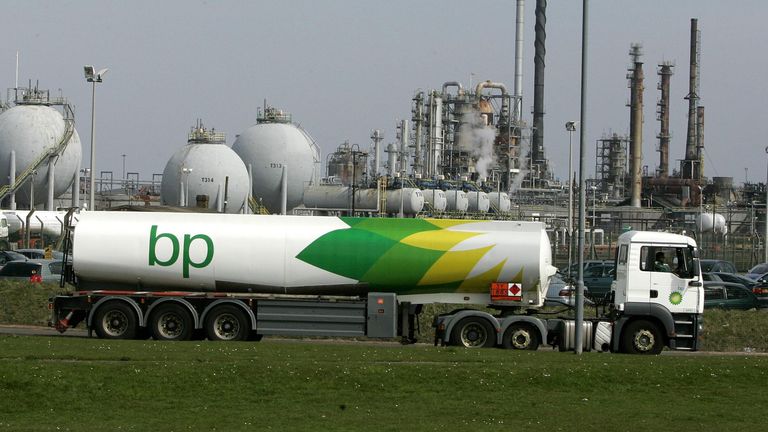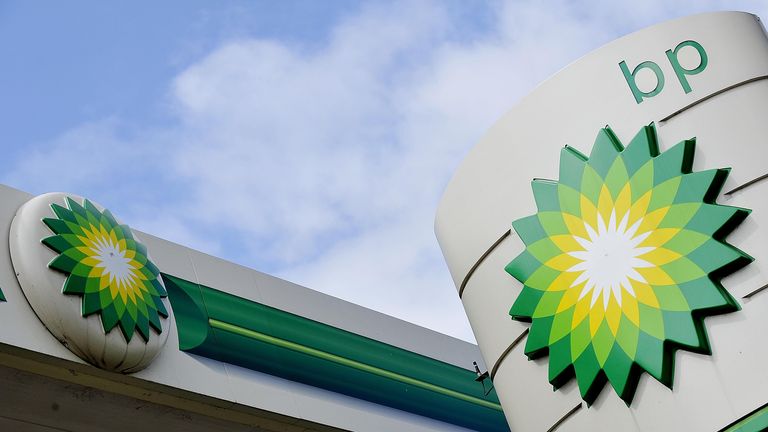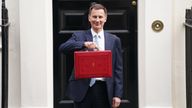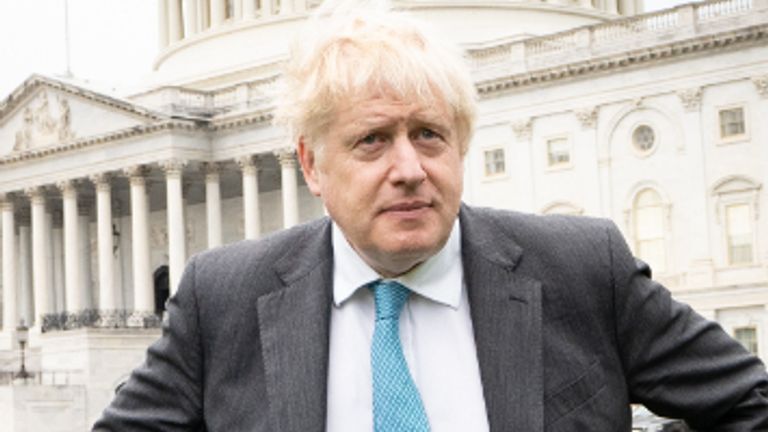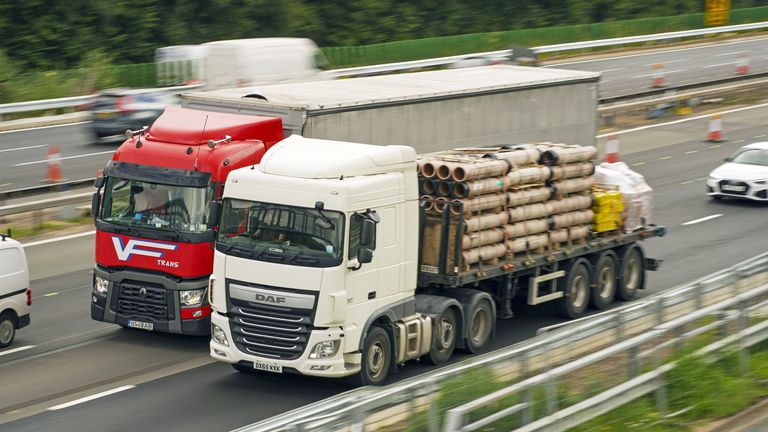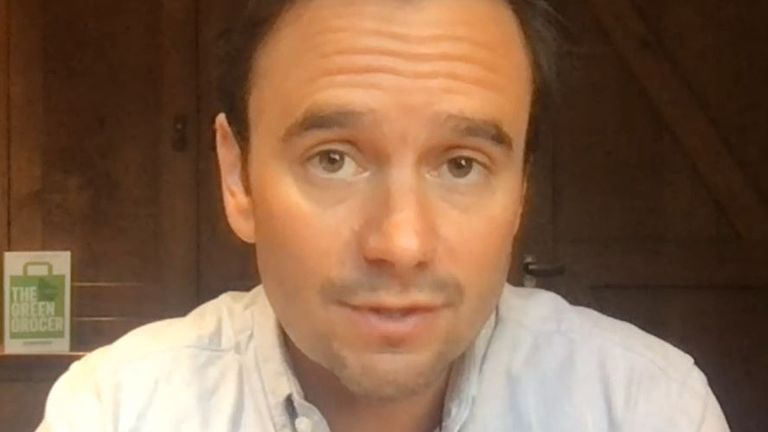Motorists urged by Number 10 to 'shop for fuel as usual' as BP shuts some petrol stations
The company insists it has plenty of fuel but too few delivery drivers to keep up with demand as petrol provision becomes the supply chain problems described as a "cocktail of chaos".
Friday 24 September 2021 07:49, UK
Motorists have been urged by the government to "shop for fuel as usual" after BP said it had closed some of its petrol stations due to supply issues.
The energy giant said tens of forecourts in its 1,200-strong network were experiencing shortages - blamed on the nationwide lack of HGV drivers - while rival Esso said a few of its sites were affected.
Tesco said two of the 500 petrol stations it operates were currently affected, describing the impact as minimal and ensuring that supply is replenished whenever this happens.
It is the latest in a series of supply chain issues being grappled with by ministers - after the separate issue of surging gas prices created a crisis in the energy sector and knock-on damage to carbon dioxide production, which has threatened to disrupt food processing.
A spokesman for the prime minister said the government acknowledged that there were "issues facing many industries across the UK, and not just in terms of HGV drivers".
He added that there was no shortage of fuel and that there was a "very resilient and robust supply chain".
"People should continue to shop for fuel as usual," the spokesman said.
Is Britain running on empty? Here's what we're short of
The shortage of drivers is blamed on a confluence of issues including non-UK workers affected by Brexit, pandemic delays holding up HGV tests, and drivers being caught up in the "pingdemic" of COVID alerts earlier this year.
Rod McKenzie of the Road Haulage Association told Sky News: "This is a cocktail of chaos, and I'm afraid it's getting worse because the attrition rate is against us.
"We have got more drivers leaving than joining, so as every week goes by there's something new in the supply chain that's creaking and crumbling."
Jim McMahon, Labour's shadow transport secretary, said: "This is a rapidly worsening crisis that the government has failed to heed the warnings of for a decade, never investing in or valuing working class jobs."
BP, which previously experienced similar disruption in July, said it was "prioritising" the sites experiencing shortages to ensure they are re-stocked first.
In a statement, the company said: "We are experiencing fuel supply issues at some of our retail sites in the UK and unfortunately have therefore seen a handful of sites temporarily close due to a lack of both unleaded and diesel grades.
"These have been caused by delays in the supply chain, which has been impacted by industry-wide driver shortages across the UK and we are working hard to address this issue.
"We continue to work with our haulier supplier to minimise disruption and to ensure efficient and effective deliveries to serve our customers.
"We apologise for any inconvenience caused."
Esso said a "small number" of its 200 Tesco Alliance retail sites - operated jointly with the supermarket chain and separate from the two mentioned by Tesco itself - were impacted.
"We are working closely with all parties in our distribution network to optimise supplies and minimise any inconvenience to customers," Esso said.
"We apologise to our customers for any inconvenience."
Tesco said: "We have good availability of fuel, with deliveries arriving at our petrol filling stations across the UK every day."
Sainsbury's, Asda and Morrisons said they were not affected. Shell was also understood not to be affected.
Gordon Balmer, executive director of the Petrol Retailers' Association - which represents independent forecourts across the UK, equating to 65% of the total - said some sites had confirmed delayed deliveries, but the issue appeared to be "confined to London and the South-East and appear temporary by nature".
He said that with fuel demand still at only 92% of pre-pandemic levels, "we believe there should be ample stock available at refineries and delivery terminals throughout the UK".
"The PRA recommends that motorists maintain sufficient fuel in the tank to enable them to get to an alternative filling station in the rare instance that fuel is not available," Mr Balmer added.
Logistics UK, which represents the logistics industry, said: "Logistics UK is aware of reports that petrol supplies are currently being affected by the HGV driver shortage.
"The driver shortage is a very serious issue that needs urgent government and industry action to resolve, however, we urge people not to panic buy.
"The logistics industry is resilient and has proven capable of supporting shops, families and businesses during COVID-19, border closures and the first stages of Brexit, and will continue to serve the needs of the nation."
The fuel delivery woes mark another front in the fight against supply chain disruption caused by the nationwide shortage of qualified HGV and tanker drivers - estimated at more than 100,000 by an industry body.
It has formed part of the UK's growing inflation problem as pay rises - to attract more drivers and retain them - add to surging bills from stiff competition for the swift delivery of goods.
Meanwhile, Tesco has warned the government that it was worried about the sight of empty shelves, caused by the driver shortage, prompting panic-buying ahead of Christmas.
BP sources stressed that there was no shortage of diesel and petrol and that therefore the situation should not be described as rationing.
However, a top BP manager was reported to have warned the government that the situation was getting worse.
The company is understood to have expressed concerns about the driver shortage issue at a meeting with government officials last week.
It warned then of a looming squeeze on the ability to get product from refineries to forecourts.
According to ITV News, the company's head of UK retail Hanna Hofer said it was important the government understood the "urgency of the situation", which she described as "bad, very bad", with BP having "two-thirds of normal forecourt stock levels.. for smooth operations".
The Road Haulage Association has led calls for ministers to back down on their refusal to add EU drivers to the Shortage Occupation List which bypasses post-Brexit legislation on immigration.
The boss of Iceland Foods used an interview with Sky News on Thursday to support the industry's position as supermarket, and other consumer brands, warn of the prospect of Christmas shortages without a flood of additional help to get supplies through.
Ministers have argued that the driver problem is a Europe-wide issue, and it is providing additional support in the form of cutting red tape to aid recruitment and testing.
